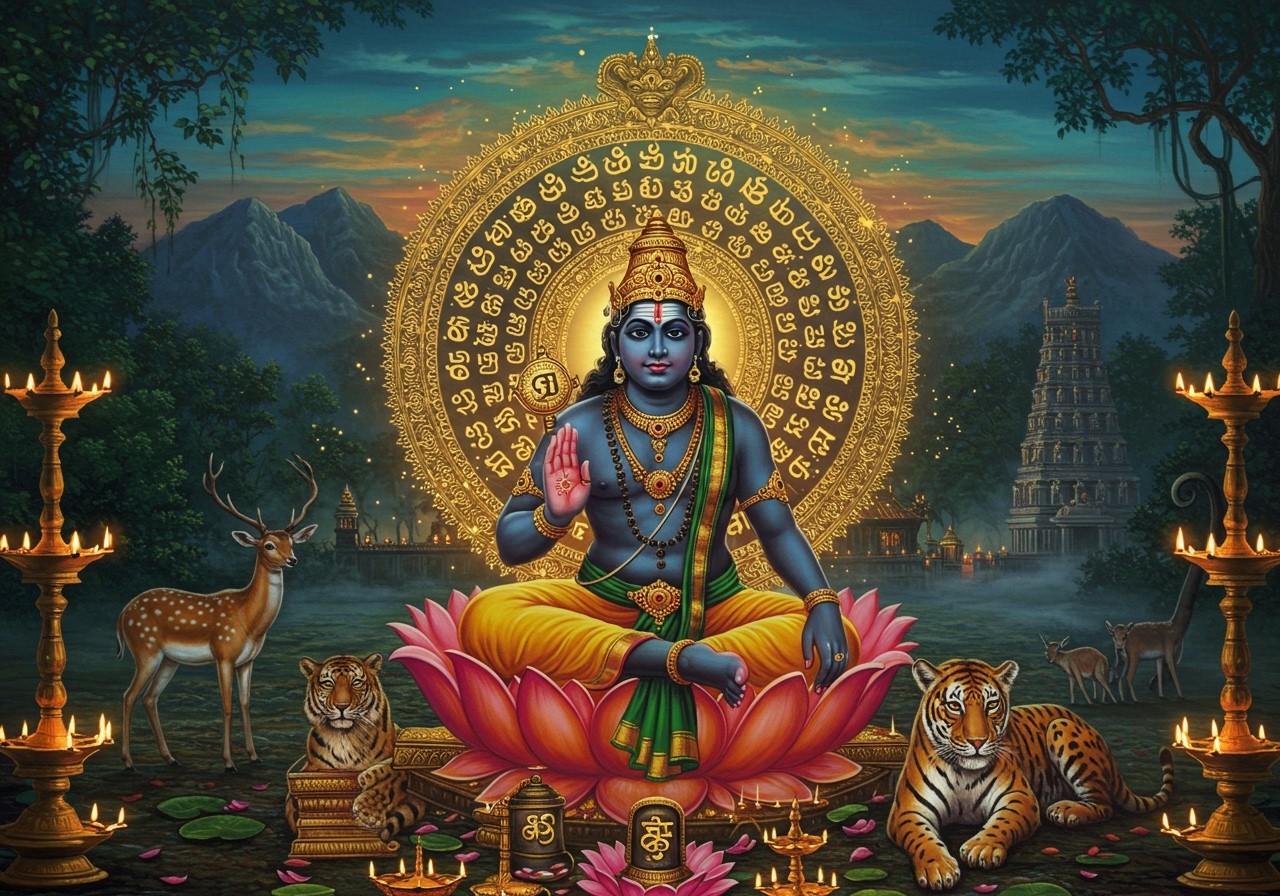
In the vibrant tapestry of Indian spirituality, Lord Ayyappan, also known as Sastavu or Sasta, occupies a revered position. He is the offspring of Shiva and Vishnu, embodying a harmonious blend of divine energies. Especially cherished in South India, with Kerala as a central point of devotion, Lord Ayyappan, also called “Sri Ayyappan” as a mark of respect, is the presiding deity of the Sabarimala temple. The annual Sabarimala pilgrimage stands as a powerful testament to the unwavering faith and dedicated discipline of his followers. This divine figure is also known as the ‘God of Growth’. His 108 names, known as the Ayyappa Ashtothram or Ayyappa Ashtottara Shatanamavali, are not mere words; they are imbued with profound meaning, each reflecting a unique facet of his divine attributes. Reciting these 108 names with devotion is believed to draw devotees closer to the Lord, bestowing knowledge, protection, good fortune, and health. This article explores these sacred names and their significance, not only in traditional rituals but also in contemporary cultural practices, particularly within the context of naming conventions for baby boys.
A Glimpse into History and Mythology
Lord Ayyappan’s unique parentage, born of Lord Shiva and Lord Vishnu (who manifested as Mohini), symbolizes a harmonious balance of masculine and feminine energies, a concept deeply rooted in Hindu philosophy. His life story, replete with tales of valor and righteousness, culminating in his triumph over the demoness Mahishi, underscores his role as a divine protector. These narratives provide a rich context for understanding the profound meanings embedded within his 108 names. Truly appreciating the significance of each name requires delving into these stories, understanding the essence of his divine journey.
The Sacred Number 108: A Symbol of Wholeness
Across various spiritual traditions in India, the number 108 holds profound significance. It represents completeness, wholeness, and spiritual perfection. When devotees chant the 108 names of Lord Ayyappan, they embark on a journey of inner peace and divine communion. Each name acts as a stepping stone towards spiritual enlightenment, purifying the mind and soul. This sacred number resonates throughout Hindu practices, from the beads of a japa mala to the repetition of mantras, weaving a thread of spiritual continuity.
You can find beautiful and authentic Japa Malas on Poojn.in to enhance your spiritual practice.
Japa Mala
Tulsi Japa Mala
Exploring the Essence of Select Names
Each of Lord Ayyappan’s 108 names encapsulates a unique story, attribute, or divine quality. For instance, ‘Hariharatmaja‘ emphasizes his divine lineage as the son of Hari (Vishnu) and Hara (Shiva). ‘Manikandan‘, meaning “one with a bell around his neck”, refers to the legend of his discovery as a baby with a bell adorning his neck. ‘Sastha‘ reflects his role as a teacher and guide, while ‘Dharma Sastha‘ highlights his unwavering commitment to righteousness and dharma. ‘Bhoomanathan‘ – Ruler of the earth, ‘Dharmasastha‘ – Protector of dharma, ‘Kaliyugavaradhan‘ – Protector in kaliyug, ‘Manikantan‘ – One with a bell around his neck, ‘Hariharan‘ – Born out of Hari (Vishnu) and Hara (Shiva), ‘Sabareeshwara‘ – One who lives in Sabari hill, are few more among these. These names offer profound insights into the virtues and qualities that devotees aspire to embody in their own lives. They illuminate the path towards spiritual growth and self-discovery.
Cultural Practices and Rituals: A Tapestry of Devotion
The chanting of Lord Ayyappan’s 108 names forms an integral part of numerous rituals, especially during the sacred Sabarimala pilgrimage. Devotees believe that this practice invokes divine blessings and fosters spiritual evolution. The 41-day ‘vratham’ (period of abstinence and spiritual discipline) observed by pilgrims often involves the daily recitation of these names. The significance of each name resonates within the offerings and rituals performed at the Sabarimala temple, enriching the pilgrims’ spiritual experience.
To learn more about Lord Ayyappan and other deities, visit our informative blogs: Lord Ayyappan: Sabarimala’s Sacred Deity and Krishna’s Names: Meaning and Significance.
Modern Relevance and Naming Traditions
Even today, the 108 names of Lord Ayyappan continue to influence naming conventions, particularly for baby boys. Names like ‘Ayyan‘, ‘Hariharan‘, and ‘Manikandan‘ remain popular choices, reflecting a deep-rooted cultural tradition. Parents often select these names with the hope of bestowing their children with the divine qualities they represent. This practice serves as a beautiful way to preserve cultural heritage and instill a sense of spirituality from an early age. It’s a testament to the enduring power of faith and tradition in shaping contemporary lives.
Poojn.in: Your Companion for Ayyappa Puja
For all your Ayyappa puja needs, Poojn.in offers a curated selection of authentic and high-quality items. Whether you are seeking a beautifully crafted brass idol of Lord Ayyappan , traditional Kerala style lamps (vilakku), premium vibhuti and kumkum, handcrafted garlands and malas, pure copper water containers for abhishekam, or organic coconuts and beetle leaves for offerings, you can find everything you need on our platform. You can also check out other idols like Panchmukhi Hanuman or Lord Kubera. Conveniently order online at www.poojn.in or connect with us directly:
- Phone: 03369029784
- WhatsApp: 9476142738
We provide contactless delivery across India, ensuring secure packaging to preserve the purity of all ritual items. Each product undergoes stringent quality checks and is accompanied by clear usage instructions in multiple languages. For bulk orders during the Mandala Puja season or for temple requirements, our dedicated team offers personalized assistance and customized packages. All items are available at competitive prices with a guarantee of genuine quality.
Embracing the Enduring Legacy
Exploring and embracing the 108 names of Lord Ayyappan opens a pathway to spiritual understanding and cultural connection. Each name carries within it a story, a teaching, and a guiding light for devotees. Whether through chanting, ritual observance, or the naming of a child, we keep the spirit of Lord Ayyappan alive within our hearts and homes. These practices serve as a constant reminder of the values he embodies – righteousness, wisdom, and the pursuit of divine connection. By continuing these traditions, we honor our heritage, strengthen our spiritual bonds, and ensure that the teachings of Lord Ayyappan continue to inspire generations to come. You can find additional resources on our blog, such as Krishna and Radha: The Story of Divine Love and Koodalmanikyam Temple: History, Deities, and Architecture.
Common Questions about the 108 Names of Lord Ayyappan
Many people wonder about the 108 names of Lord Ayyappan. What are they exactly? These names are a sacred collection of divine appellations, chanted by devotees to express their reverence and seek blessings. Each name illuminates a different facet of Lord Ayyappan’s divine persona and attributes.
Why is chanting these 108 names so important? The practice is believed to bring peace, prosperity, and divine protection. It helps focus the mind and heart on the divine, fostering spiritual growth and deepening devotion. It’s like weaving a tapestry of connection with the divine through each whispered name.
Can these names be used for baby names? Absolutely. Many of Lord Ayyappan’s 108 names are beautiful and meaningful choices for baby boys. These names not only sound pleasing but also carry a deep spiritual significance, imbuing the child’s life with blessings.
How can I incorporate these names into my daily worship? You can recite the 108 names during your daily puja or incorporate them into your meditation practice. Listening to a recording of the chants or reading them aloud can also be a powerful way to integrate them into your spiritual routine. It’s about finding what resonates most with you and creating a space for the divine in your everyday life.
What is the special meaning of the number 108 in Hinduism? In Hinduism, the number 108 holds a sacred resonance. It’s believed to symbolize the wholeness of the universe and is frequently incorporated into spiritual practices like chanting and meditation. It’s a number that connects us to the cosmos and the divine order.
Are there specific rituals associated with the 108 names? While no strict rituals are prescribed, many devotees find it enriching to light a lamp or offer flowers while reciting the names. This adds another layer of reverence and devotion to the practice, creating a sacred atmosphere.
Where can I learn more about the meanings of these names? You can explore the rich meanings and significance of each name in religious texts or on reputable spiritual websites. These resources offer deeper insights into the stories and symbolism behind each name, enhancing your understanding and devotion.
Do I need to understand the meaning of every single name? While understanding the meanings can certainly enrich your devotion, it’s not strictly necessary. The sincerity and devotion with which you chant the names are what truly matter. It’s about the connection you forge with the divine, regardless of the depth of your scholarly knowledge. It’s about opening your heart and letting the divine in.


